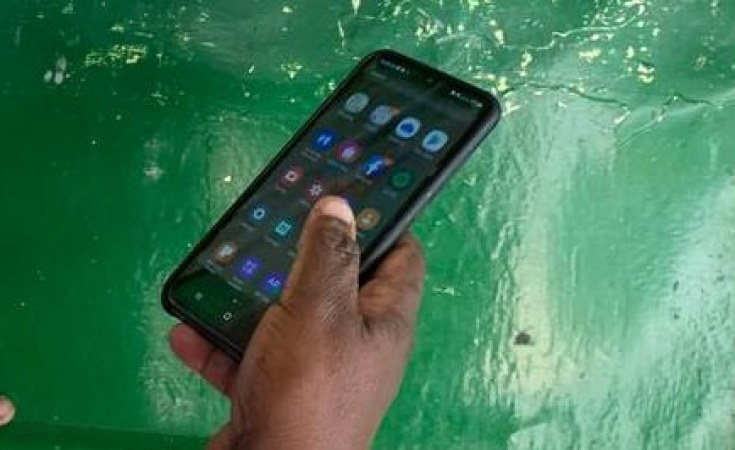Loans through mobile apps have skyrocketed in Kenya. While this fintech industry provides easy-to-access credits, it has become a nightmare. Experts fear the largely unregulated market could lead to a credit crisis.
James Wachira is a struggling businessman in Kenya's capital, Nairobi. Making ends meet daily is not his only challenge -- he is also in massive debt. "At one point, I remember at the end of the month I was having from three [mobile] applications, asking for about Ꞓ600 ($656)," Wachira told DW.
A recent government survey reveals that more than 80% of Kenya's adult population uses mobile money providers. And according to a financial technology (fintech) research institute, FSD Kenya, the number of digital lenders and loans disbursed grew substantially after the launch of M-Shwari in 2012. M-Shwari is a Safaricom savings and loan service that enables M-PESA customers to save and access loans.
Before this fintech boom, Kenyans used traditional bank loans and an informal credit system known as Sacco (savings and credit corporations).
The easy-to-access credit industry that exploded with the tech boom now faces considerable criticism, with concerns ranging from debt-collecting methods to additional charges.
The two methods frequently used by creditors are debt shaming and incessant calls. "You have to look for money to repay so that you can borrow again to stay afloat," Wachira said.
Multiple loans
Many young Kenyans both with and without formal employment are at high risk of defaulting. But mobile app lenders seem not to care much, leading some unemployed Kenyans to take credits from more than five mobile apps simultaneously.
Kenya's Central Bank (KCB) revealed that, as of November 2022, about 14 million accounts had been listed for defaulting on digital lending apps.
Many borrow from one app to pay another, leading to a vicious cycle. KCB puts the loss to loan interests at approximately $1,200 per person each month.
Debt shaming
The lending apps use debt shaming to retrieve their loans and interests. When a person defaults, their family and social circles also receive regular phone calls informing them about the debt.
James Wachira, who has defaulted on a few loans, became a victim of the tactic. "My fiancee did not know I had collected a loan, so she was called and immediately she called me to confirm whether I had taken the loan."
But such phone calls do not worry Michael Atira, who has also defaulted on several loans. Like him, Kenyans are used to borrowing when times get harder and repaying when it's easier. The 14 million defaulted accounts provide some comfort to Atire.
"Since it's 14 million Kenyans listed, that is even more like a social grouping of defaulters," Atira told DW. "The membership is even bigger than most Sacco since there is no Sacco in Kenya that boasts of such a high membership."
Easy loan in hard times
The use of mobile phone apps to take loans increased in Kenya during the global economic slowdown unleashed by the coronavirus pandemic and war in Ukraine.
"I was just going through my phone and found apps that were offering loans," Eunice Kimani said. Like many other Kenyans going through hard times, Kimani signed up.
Without much understanding of interest rates, many dive deep into debt. "We borrow these loans to deal with the immediate problem, but once the problem is solved, payment ceases to be a priority, since you do not have money to pay back," Kimani told DW. Eventually, she defaulted.
"We need to protect the consumers on the kind of interest rates that are charged by digital lenders," Jared Getenga, CEO of Credit Information Sharing in Kenya, told DW. Getenga stressed that other aspects of credit lending need to be regulated: For example, how data is used.
Calls for digital lending companies to be regulated have grown. There are no fixed interest rates, and Kenya's 2019 data protection laws could not keep up with the fast-growing fintech market.
After reports emerged that some digital lending apps collect private data, including contact lists of their clients, and pass them on to third-party firms for commercial use without seeking permission, KCB issued a stern warning against this practice.
Economic bubble
Industry experts fear the 14 million defaulted accounts could create a bubble in the economy, where huge numbers are recorded as cash flow. When this exceeds the actual money involved in the transactions, it could lead to a credit crunch and eventually economic recession.
Kenyan regulars now want to stop the so-called digital lending craze. The government asked the Credit Reference Bureau to delist any accounts with less than Ꞓ50,000 from the default list.
But the directive does not seem to be able to stop debt calls. James Wachira says he receives several calls each day.
"They call you every single day. The minute your day begins, they start calling you multiple times and they have over 30 different mobile numbers. They call you with one; if you do not pick up their call, they call you with another number and different one. They do not relent."
Edited by: Chrispin Mwakideu


